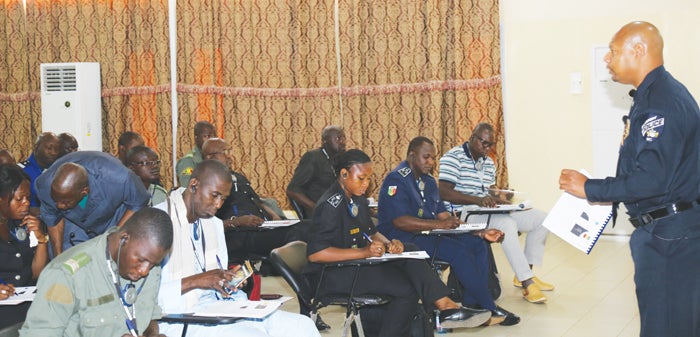City manager, deputy police chief reflect on Africa trips
Published 12:00 am Tuesday, March 26, 2019

- Salisbury Deputy Police Chief Shon Barnes teaches the Mali National Police and Gendarmerie about background checks in Bamako, Mali. Barnes traveled to Mali on Oct. 15-20.
SALISBURY — Salisbury Deputy Police Chief Shon Barnes was approached last summer about traveling to Mali, a country in West Africa, to teach best practices in policing.
After getting his visa and numerous shots, Barnes and Greensboro Police Department Sgt. Alexander Ricketts flew to Mali’s capital, Bamako, to develop background investigations and encourage community policing for the National Police and Gendarmerie on Oct. 15-20. The two were invited by the Southern Police Institute.
“That trip, probably more than any other travel experience I ever had in my life — it literally changed my worldview because of the great appreciation for American policing and understanding that American policing is the gold standard for the world,” Barnes said. “Just being able to impart some of the things we’re doing here in Salisbury in another part of the world was amazing to me.”
The Gendarmerie had not done background checks on its employees for more then 40 years — a common practice in the U.S. and one that helps eliminate corruption in policing. Barnes also taught about the importance of community policing, spreading some of the techniques the Salisbury Police Department uses.
“Community policing is universal,” Barnes said. “People no matter where they live want to be treated with dignity, respect and trust and get trust from their law enforcement community. And that was one of the things that we talked about over there is you look for the type of candidate that understands dignity, respect and decision neutrality in your policing.”
Barnes and the police students continuously said “One Mali,” showcasing the need for unity and their appreciation to Barnes and Ricketts.
“We let it known from the time we walked in there we’re here to make it better and our thing is to make sure you guys understand 21st-century community policing and how to begin to organize your police department,” he said.
The training, a partnership between the U.S. and Mali through the Security Governance Initiative, is being phased out, but Barnes continues to advocate for programs like these for law enforcement officers.
“Anything that increases your worldview is good for where you are because one thing I know about Salisbury is this is an ever-emerging, diverse city. And to think that people here are one type or one thought process is definitely wrong,” Barnes said. “When you’re able to travel and experience different things, you can come back here and relate to the citizenry a little bit better.”
City Manager Lane Bailey also traveled to Africa, going to Tanzania on June 25 -July 14. He learned about how other countries organize local government and facilitated discussions about how to improve the operations of municipalities.
Tanzania faces challenges related to infrastructure similar to many American towns. Bailey said the country struggles with businesses operating without licenses, no deeds and a need for programs for women and youth.
“It was a very neat experience, very fulfilling,” Bailey said. “I’m not saying that we don’t have problems here in Salisbury but if you look at the challenges that they’re looking at there, it just gives you a different perspective.”
One of Bailey’s colleagues sent him an email that had a lasting effect on him. He signed it “pamoja.” At first, Bailey didn’t understand. The word means “together.” He was returning to his hotel one night and someone said to him, “Together, Lane, together.”
Pamoja comes from the saying “Together we build a house. Someone brings straw, another mud.”
“Together you build a house,” Bailey said. “It’s pamoja. It’s together we’re building a better Tanzania.”
“I’m 55, and this is the most divided I’ve ever seen our country,” Bailey said. “I think we could use a little pamoja — togetherness.”


